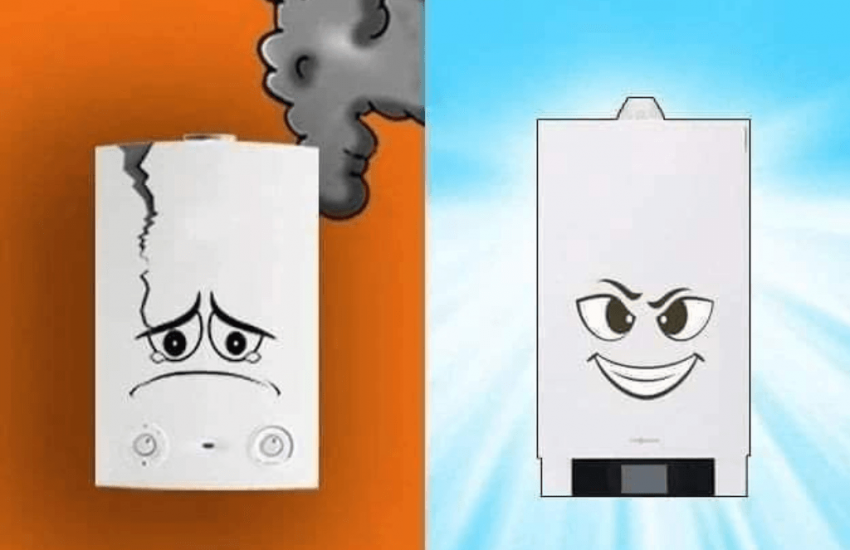1️⃣- Hot water but no heating
A boiler should provide your home with central heating and domestic hot water. If you’ve found that you’re getting hot water from the taps but no central heating, there’s a problem.🕵
Thermostats allow you to control the temperature of the central heating, as well as the time it should come on. If the heating hasn’t come on at the expected time, double-check the settings. 🌡
Boiler pressure is a term used to describe the pressure of the hot water running through the central heating system. Should the boiler pressure drop too low, the central heating will fail to
Work.🔧
Increasing the boiler pressure is something you can do without calling out a heating engineer. However, if you’re the slightest bit unsure, don’t hesitate to contact a professional.
Thermostat troubles and low boiler pressure aren’t the only reasons why you might have domestic hot water but no heating…
If your thermostat is fine and the boiler pressure is high enough, there could be a fault in need of professional repair. Common causes of hot water but no heating include broken diaphragms and airlocks or a failure of the motorised valves.
For heating systems that include a combi boiler, there could be an issue with the diverter valve. Combi boilers provide heating and hot water on demand and the diverter valve directs the hot water to either the radiators or the hot water outlets. If it gets stuck, you could end up with hot water but no heating, or vice versa.💧
An iSafe Gas engineer will be able to diagnose faulty diaphragms and airlocks, motorised valves, or diverter valves and carry out the necessary repairs or replace broken parts.✅
2️⃣- No heat or hot water.
You should be able to rely on your boiler to provide your home with heating and hot water. If you find that it isn’t able to do either then you’ll want to get it fixed as quickly as possible. There’s no single issue that can lead to your boiler failing to provide heat or hot water.🔍If your boiler is receiving power then we can begin looking further into possible issues. Your boiler should display an error code to help you locate the source of the problem. However, to give you some ideas, possible issues include:
Fuel isn’t making its way into your property. If you have a gas boiler, ensure that your gas supplier is still supplying fuel. Should you have an oil boiler make sure there’s plenty of fuel
in the storage tank.🏠
Double-check the thermostat settings and set the desired temperature higher than the current room temperature. 🌡
The condensate pipe has frozen and needs thawing out. ❄
Low boiler pressure so ensures the boiler pressure is set according to the manufacturer’s instructions (usually between 1 and 2 on the pressure gauge).📈
Older boilers will have a pilot light (a small flame that constantly burns before lighting a larger flame when heating or hot water is needed). If the pilot light goes out then the boiler won’t be able to fire into action.🔥
3️⃣- Boiler is leaking
A leak coming from your boiler is never a good sign. And the cause of the leak will depend on where the water is coming from.💧
It’s important to note that you should never attempt to repair a boiler leak yourself – always call out a Gas Safe registered engineer.⚠️
The most common cause of a leaking boiler is a broken internal component, such as a pump seal or pressure valve. If the leak is coming from the pressure valve it could be the case that the boiler pressure is too high. Meanwhile, a leak from the pump seal is a sign that it may have worn out and needs replacing.🔧
In the case that the boiler is leaking around the pipes or tank then that’s a strong indication of corrosion. Otherwise, it could be the result of a poor installation. Either way, we recommend calling out an iSafe Gas engineer who will be able to diagnose and fix the leak.
4️⃣- Boiler is kettling
Hearing a strange rumbling noise similar to when a kettle is boiling? When lime scale or sludge builds up on your boiler’s heat exchanger (a coil that transfers heat from the fuel to the water that will circulate around the heating system) you can get something called kettling.🔊
Kettling is more common in areas with hard water but can affect boilers in soft water areas too. Not only does it cause your boiler to work harder and thus cost more to run, but it can also shorten the system’s life.♻️
If your boiler is kettling, it’s advisable to call out a Gas Safe registered engineer. The engineer will likely flush out your system to remove the build-up of these deposits and ensure the system is working properly once more.✅
5️⃣- Noisy boiler
From banging and clanging to whistles and gurgles, a heating system can make some noises caused for several reasons.
If you hear a noise coming from the boiler or heating system, don’t ignore it as there’s probably a fault!!
The potential fault will vary depending on the type of sound and where it’s coming from.
We’ve listed some common boiler noises below to help you find the cause.🔊
📢 Whistling
We’ve already covered kettle-like sounds, caused by a build-up of sludge on the heat Exchanger.
📢 Banging
Banging will commonly be caused by the pipework or an internal component coming loose but could also be the result of debris building up on the heat exchanger. Some banging noises could potentially be an indication that the pump – which pumps hot water from the boiler around the central heating system – is close to failing.
📢 Clanking
A sound not too far from banging is a clanging noise that could again be caused by loose pipework. Alternatively, it could mean that the boiler fan is being obstructed.
📢 Buzzing
A buzzing noise could indicate that electrical components within the boiler are malfunctioning and likely need to be replaced. If the buzzing noise is coming from the thermostat then it could mean that the conductor is dirty and needs to be replaced.
📢 Humming
Boilers tend to have some operational noise that resembles a slight humming – for the most silent models look out for boilers that have been Quiet Mark accredited – but a loud humming could be the sign of a loose part (most likely the central heating pump).
📢 Gurgling
Too much air within the pipes can cause blockages that prevent the water from circulating around the heating system. Should you be hearing this by a radiator then it’s likely that they need to be bled.
6️⃣- Low boiler pressure
Boiler pressure is a measurement of the pressure of the hot water passing through the central heating system. Should the boiler pressure drop too low then the central heating will fail to work.🔧
Your boiler will feature a pressure gauge that can be used to read the boiler pressure. If the needle is anywhere below 1 then the pressure is too low. Typically boiler pressure should sit somewhere between 1 and 2. However, you should consult the manufacturer’s instructions to find the appropriate pressure for your boiler.📖
All boilers will very gradually lose boiler pressure over time but a sudden sharp drop could be the sign of a bigger issue. So if you’ve noticed a drop in boiler pressure check for water leaks and cold patches on radiators (as they may need bleeding).💧
Increasing boiler pressure is something you can do yourself although you shouldn’t hesitate to contact an engineer if you need to. 👍
7️⃣- Frozen condensate pipe
Condensing boilers have a condensate pipe that leads acidic water, produced as the boiler operates, away from the unit and down a drain. Many condensate pipes are external to the property which, as they contain liquid, can make them prone to freezing.❄
To prevent the condensate pipe from freezing in the future, your heating engineer may recommend lagging the pipe. Lagging simply means wrapping the pipe with insulation to keep it warmer and lower the risk of it freezing.🌡
TOP TIP: You can thaw out the condensate pipe yourself by pouring warm (not boiling) water over the frozen area.✅
8️⃣- Boiler not responding to thermostat
There is a wide range of thermostats that homeowners can choose from to help increase the efficiency of their homes. These thermostats can work great, but it can also be frustrating when the boiler stops responding to the thermostat.🤦
If you suspect that your boiler is no longer working with the thermostat, first make sure that the temperature on the thermostat is above the current room temperature. If it is not, then the thermostat is likely working fine.🌡
If the room temperature is below the thermostat temperature, try replacing the batteries in the thermostat or moving it closer to its receiver. If this does not work, it may be that the thermostat is faulty and needs to be replaced.🏠📈
9️⃣- Boiler keeps switching off
If left unserviced, a boiler may over time begin to randomly switch off.
There are a number of potential reasons for this, including:
- Trapped air in the system
- Low boiler pressure
- High boiler pressure
- A faulty thermostat
- Debris and sludge building up in the pipes
If you notice that your boiler keeps switching on and off, it may be due to one of these faults. Depending on the severity, an iSafe engineer will be able to say whether the problem can be fixed, or whether a new boiler could be a more economical option long term.
🔟 Pilot light going off
If you have an older boiler you may have a pilot light that needs to be constantly lit to light the larger boiler burner. However, over time the necessary parts for lighting the pilot switch can become faulty, such as the thermocouple.🔥
If your pilot light keeps turning off, do not try to repair/replace this yourself. This would require taking off the boiler casing, which is illegal unless you are registered with the Gas Safe Register. Instead, first, check that your other gas appliances are working correctly. If they are not, the issue might be with the gas supply itself. If the other gas appliances are working correctly, there may be a faulty part, so call a Gas Safe registered engineer to resolve the problem. Newer boiler models are not built with pilot lights so do not suffer from this issue.👍








